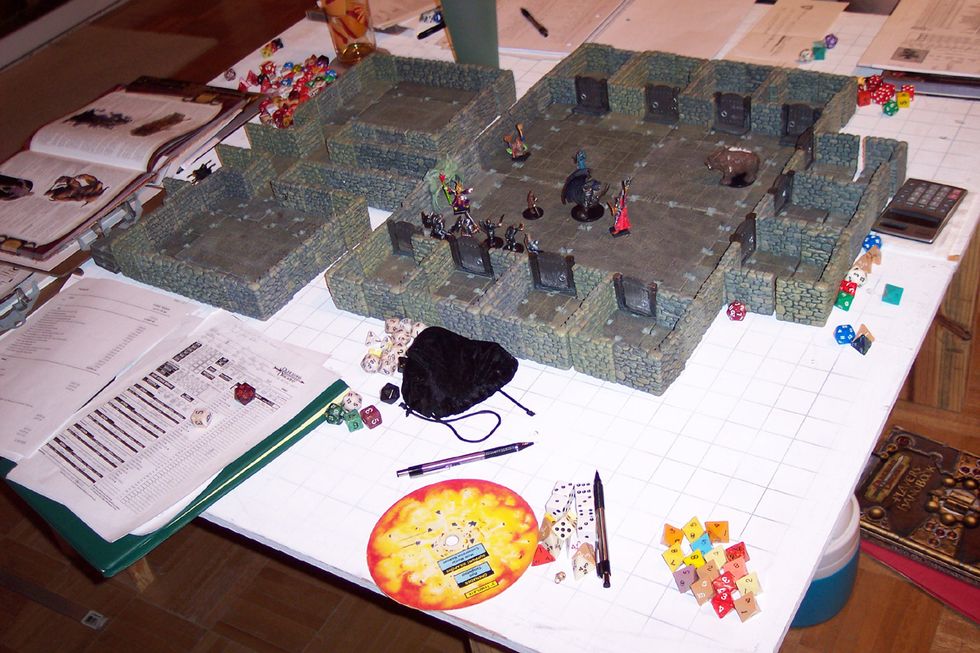The genre of "Roleplaying Games" encompasses a large selection of games, whether tabletop games (such as Dungeons & Dragons or FATE) or video games (like Elder Scrolls or Star Wars: Knights of the Old Republic). For the purposes of this article, I will stick to the original roleplaying game, Dungeons & Dragons, as the central game reference. If you do not understand the lingo of roleplaying games, do not fear.
Now, a typical game of Dungeons & Dragons, which is also abbreviated as D&D or DND, requires four to six players and a person to be the Dungeon Master - the lead writer and organizer for a game of D&D. Character creation for D&D can occur in several different ways, but the players usually go in with a certain idea of what type of character they want to play, whether they realize it or not. The party in this article will consist of four players named Brandon, Elizabeth, Hailey and Matthew. Let's look at our players!*
Brandon is 20 years old, is a pre-med major, wants to be a physical therapist, loves Star Wars and will be playing the neutral good human cleric in the party. His decision to play the cleric seems like an arbitrary decision and is just a character he wants to play. These facts about Brandon and his decision to play the cleric give a lot of hints as to whom he is.
Firstly, clerics and physical therapists heal and help. This shows that Brandon is a helper by nature and wants the best for people no matter the costs. Clerics also rely on holy beings to gift them their powers, similar to how Jedi tap into the Force to guide them. Brandon's love for Star Wars also reveals that he has fictional experience and can probably get into character fairly well. These are superficial connections, but open doors to even more analyzing.
Elizabeth is 21 years old, is a political science major, has a fascination with how politicians run their campaigns, is the reigning champion in the campus's chess club and will be playing the chaotic neutral halfling rogue. The first thought that comes to mind is why someone who wants to be a part of the political scene will play a character who deliberately breaks laws.
A lot of satirical comments can be made, but the subconscious reason may be because Elizabeth knows she will be in a field where she must obey laws, so D&D is her outlet to break some rules. Along the same lines, rogues are maticulous characters and perform acts with precision, much like a game of chess. However, this desire to play a character that breaks rules and precisely makes decisions to accomplish goals may reveal a little bit of narcissism within Elizabeth...
Hailey is 20 years old, is an elementary education major, consistently posts poetry on her Tumblr account, is the mom friend and will be playing the true neutral dwarf barbarian. Clearly, everything that Hailey is on the surface is the exact opposite of the character she is playing, but that may be the point. Like Elizabeth's character, Hailey will use her barbarian as a way to deviate from her normal self.
Not only will it be cathartic for Hailey to play this character, but it will also be a challenge for her as the player, which proves that she probably has experience with roleplaying games. From a deeper psychological lense, playing a dwarf barbarian might also be a little revealing to some destructive feelings Hailey may be hiding...
Matthew, who also goes by Matt, is 19 years old, a theatre performance major, has a joke for every situation, thinks he is slick and will be playing the chaotic good elf bard. This seems to fit. Bards are performers and actors, much like Matt on a day-to-day basis. This seems like an open-and-close kind of case, right? Nope. Matt's bard will oftentimes use his silver tongue to get out of every kind of encounter they come across.
And if that does not work, his bard magic can mystically persuade his opponent, much like a Jedi mind trick. Along the same lines, Matt's bard and Elizabeth's rogue will sometimes create elaborate plans to circumvent an opponent's expectations or to get the jump on them. This all seems perfectly fine and dandy. But what happens when the bard is confronted by a towering orc with an axe made of elven bones? He will soon realize the orc is too stubborn to hear his smooth words and may be forced to take him down in combat, which he is not equipped to do. Again, it sounds like a typical bard.
However, Matt's choice of a bard reveals a lot about him. It may show that Matt is bad with confrontation. It may show that he will do what he can to avoid conflict. It may even show that Matt may be trying to hide behind his goofy demeanor. This is all speculation and could easily be true as it could be untrue. It is a Schrödinger's Cat.
The concept of using roleplaying games as a way of therapy is a growing field that I believe should get more attention. This is not meant to make you self-conscious about the type of characters you play in roleplaying games. If you play D&D with me, do not let this freak you out. Roleplaying games are a judgement free zone, and we are all there to have fun. This article is just a product of loving D&D and crime TV.
*Disclaimer, the players described in this article are not real people (probably).









































